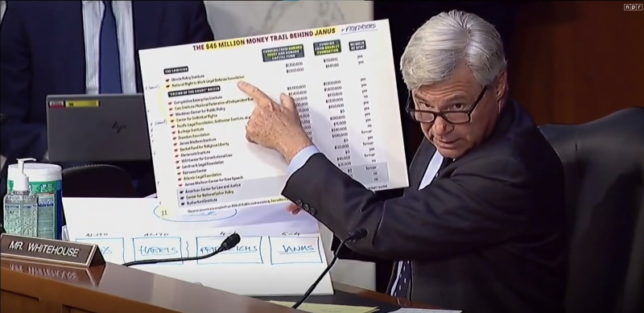Commentary
Sheldon Whitehouse’s Hypocrisy on Liberal “Dark Money” Isn’t Fooling Anyone
 Sen. Sheldon Whitehouse (D-RI) lectures on conservative "dark money" during Barrett confirmation hearing. Credit: NPR.
Sen. Sheldon Whitehouse (D-RI) lectures on conservative "dark money" during Barrett confirmation hearing. Credit: NPR.

Sen. Whitehouse, the charade is wearing thin.
For one senator, the Democrats’ leading hawk for donor disclosure, the confirmation hearings for Supreme Court nominee Amy Coney Barrett were an excuse to subject the nation to a bizarre, nearly half-hour rant about right-wing “dark money.”
“Something is not right around the [Supreme] Court,” scolded Sen. Sheldon Whitehouse (D-RI), “and dark money has a lot to do with it.”
Critics likened his cryptic charts—purportedly revealing the conservative puppet-mastery behind Barrett’s nomination—to a Glenn Beck chalkboard routine and A Beautiful Mind. Others called him a “loon.”
Questioning Without Questions
But absent from Whitehouse’s “crazy man” routine was a single question for Judge Barrett—you know, the actual subject of the hearings. As usual, the junior senator from Rhode Island is less interested in facts than he is in hand-waving and fearmongering about what he calls the “grimy swamps of dark money influence” in our courts. (The following day Whitehouse, in an interview with the Atlantic, called the U.S a “money-laundering haven” and a “sleazy offshore principality” for so-called dark money.)
Sadly, conspiracy theorizing is par for the course in today’s Left, which sees shadowy conservative billionaires under every bed but manages to miss the larger “dark money” networks on the Left.
Arabella Advisors
Take just one example: Arabella Advisors, which manages a left-wing nonprofit empire whose total revenues in 2017–2018 were over $1.2 billion—more than twice that of the Republican and Democratic National Committees combined. Arabella runs hundreds of “pop-up” groups—websites made to look like standalone organizations—including Demand Justice, a court-packing group that spent millions savaging Barrett’s confirmation after doing the same to Brett Kavanaugh in 2018.
One branch of the Arabella network, the Sixteen Thirty Fund, has been hammered by Politico as a “massive ‘dark money’ group” and a “liberal secret-money network.” As the Washington Post explains, Sixteen Thirty assists “big campaign donors who want to have impact but hide their identity.”
Yet as far as Sen. Whitehouse is concerned, the Arabella network—which doesn’t disclose its donors and has yet to be described by a major newspaper—gets a pass.
Perhaps that’s because Arabella is the elephant in the room for Whitehouse’s special interest narrative, which—as Sen. Ted Cruz (R-TX) pointed out—omitted any reference to Arabella in his “dark money” diatribe last week.
Arabella was also the poster child for untraceable cash in a congressional subcommittee hearing in September on the role of outside spending in “court capture.” Sen. Whitehouse appeared in that hearing as the star witness, but refused to take any questions, possibly for fear his own “dark money” connections would be exposed.
ActBlue
In a final irony, Whitehouse fundraises through ActBlue, the Left’s favorite “dark money” machine—a platform whose 501(c)(3) and (c)(4) wings report their pass-through grants as a single, unidentifiable lump, so they don’t have to disclose which groups they passed money to or how much each group received. Given the Left’s loathing for untraceable money, that’s shocking hypocrisy.



